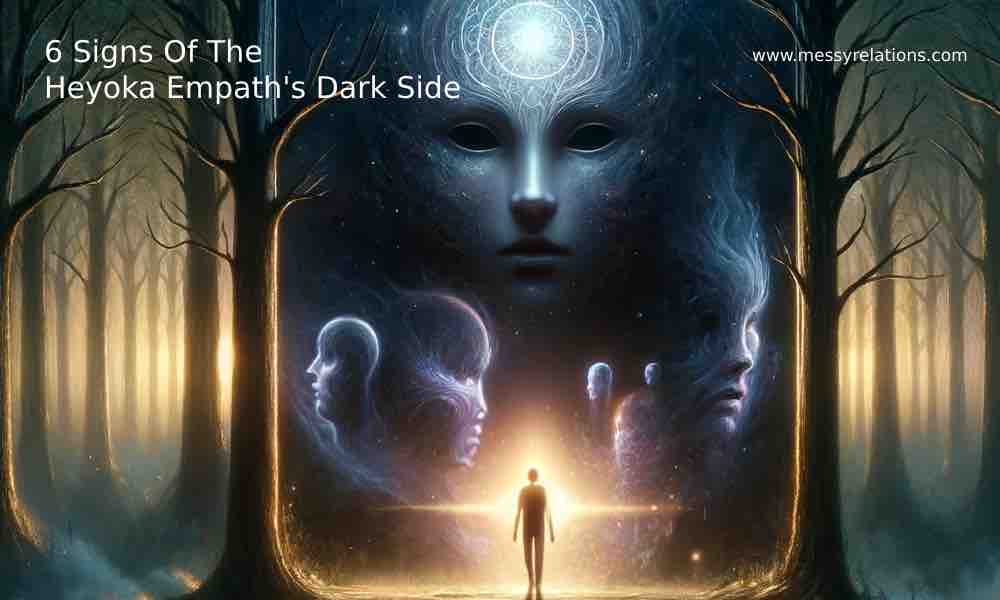In the realm of emotional intuitiveness and empathy, the Heyoka empath stands out as a unique and somewhat mystical figure. Often referred to as the “sacred clown” in Native American cultures, their unconventional methods and mirrored responses make them powerful agents of personal growth and spiritual awakening. However, like all facets of human nature, there exists a darker undercurrent – the Heyoka empath dark side. This aspect, often overshadowed by their transformative potential, is crucial to understand, not only for those who identify with this archetype but for everyone interacting within their orbit.
The Essence of Inversion
Heyoka empaths are known for their ability to reflect the emotional or psychological state of those around them through inversion, acting as a mirror to encourage introspection and self-awareness. But what happens when this mirroring escalates into confusion and discomfort?
Misunderstanding and Alienation
The first sign of the Heyoka empath’s dark side can be seen in the realm of social interactions. Their unconventional and often paradoxical approach, while enlightening, can sometimes lead to misunderstanding and alienation. Their intent to stimulate growth can be perceived as mockery or disdain, distancing them from those not ready or willing to confront their inner selves.
Overwhelm and Emotional Drain
The second sign emerges from the intensity of emotions they engage with. Heyokas, by their very nature, delve deep into the emotional spectrums of those they interact with. This can lead to overwhelm, where the sheer volume and intensity of negative emotions mirrored back can become a heavy burden, not just for the Heyoka but for those around them as well.
The Labyrinth of Self
As conduits of emotional reflection, Heyoka empaths walk a thin line between enlightenment and entrapment in their own psychological labyrinth.
Losing One’s Self
The third sign is the risk of losing one’s sense of self. In their constant mirroring of others’ emotions and traits, Heyokas might struggle to hold onto their identity, becoming too entangled in the energies they reflect. This loss of self can lead to a profound existential crisis, questioning their purpose and essence.
The Seduction of Power
The fourth sign is the seductive lure of power. The ability to influence and catalyze change in others is potent, and without careful self-awareness, a Heyoka empath might find themselves misusing this gift, manipulating situations to their advantage or for the sheer thrill of impact, veering away from their spiritual path.
The Shadow of Isolation
In their journey, Heyoka empaths might inadvertently construct walls of isolation around them, amplifying the darker aspects of their nature.
Solitude by Choice or Circumstance
The fifth sign involves the deep sense of isolation that can envelop a Heyoka. Whether by choice, as a means to recharge and escape the overwhelming influx of external emotions, or as a result of the misunderstandings and conflicts their methods might incite, this isolation can exacerbate the darker tendencies, leading to detachment and cynicism.
The Echo Chamber of Negativity
Finally, the sixth sign is the potential for a Heyoka to become ensnared in an echo chamber of negativity. As they absorb and mirror the darker aspects of those around them, without an outlet or a balanced perspective, this negativity can become amplified, clouding their judgment and diminishing their ability to serve as catalysts for positive change.
Moving on the Shadows
Understanding these signs is not an indictment of the Heyoka empath’s role or significance in spiritual and emotional realms. Rather, it serves as a reminder of the delicate balance required to navigate the profound depths of empathy and introspection. For Heyokas and those around them, awareness of these darker tendencies can pave the way for more mindful interactions and personal growth, ensuring that the light of transformation remains the guiding force in the dance of mirrored emotions.
The Heyoka empath’s journey is one of profound depth, reflection, and potential. By recognizing and acknowledging the darker aspects of this path, both Heyokas and those influenced by them can foster a more balanced, compassionate, and enlightened interaction, turning the mirror of introspection into a window of profound insight and mutual growth.
Frequently Asked Questions (FAQs)
What is a Heyoka Empath?
A Heyoka empath, often recognized in Native American cultures as a “sacred clown,” possesses the unique ability to mirror and invert the emotions of those around them, facilitating deep introspection and spiritual awakening. Their unconventional methods serve as a catalyst for personal growth, challenging individuals to look within and confront their shadow selves.
How can you identify the dark side of a Heyoka Empath?
The dark side of a Heyoka empath can manifest in various ways, including misunderstandings and alienation due to their paradoxical actions, emotional overwhelm from absorbing intense negative energies, loss of self-identity, misuse of their influential power, deep-seated isolation, and becoming trapped in a negativity echo chamber.
What are the consequences of a Heyoka Empath’s dark side on others?
The consequences can range from confusion and discomfort among those interacting with a Heyoka, to strained relationships due to misunderstandings of the Heyoka’s intentions. In some cases, individuals may feel emotionally drained or manipulated, highlighting the importance of Heyokas maintaining self-awareness and balance in their interactions.
How can Heyoka Empaths manage their darker tendencies?
Managing the darker aspects involves a conscious effort to stay grounded and self-aware, regularly cleansing their emotional palette to prevent overload, setting clear boundaries, and seeking supportive communities that understand and respect their unique path. Mindfulness practices and self-reflection are key tools for Heyokas to navigate their emotional landscape healthily.
Can understanding the dark side of Heyoka Empaths lead to personal growth?
Absolutely. Recognizing and addressing the darker facets of Heyoka empaths not only facilitates their own growth but also enriches the personal development of those around them. It encourages a balanced approach to emotional reflection and empathy, fostering healthier relationships and a deeper understanding of the interconnectedness of our inner worlds.



